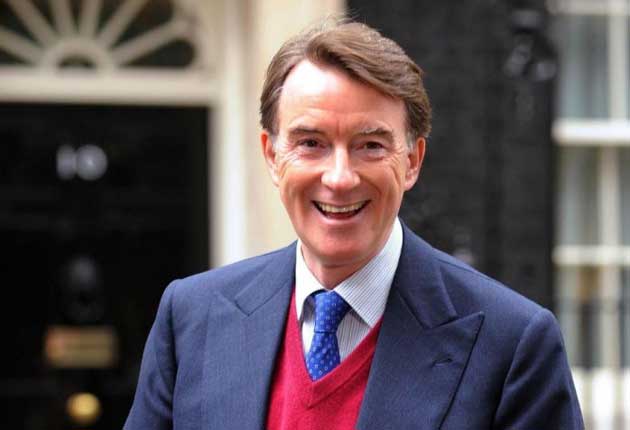A third crack at the Cabinet – courtesy of his sworn enemy
Twice he has held ministerial office, and twice he has been forced to step down. But Peter Mandelson has been given another chance by Gordon Brown, despite their history of feuding.

Even when he left for Brussels in 2004, Peter Mandelson was in regular telephone contact with Tony Blair, sometimes on a daily basis. Remarkably, in recent months, the famously efficient Downing Street switchboard has had a similar number of "it's Peter here" calls for Gordon Brown.
The two men were once described as "two scorpions in a bottle; only one of them will crawl out alive," by Michael Wills, a friend of both and now the Justice Minister. He repeatedly tried to ensure the blood brothers-turned-enemies made up. Dinners of reconciliation were organised but never happened. Mr Brown could not forgive what he saw as an act of betrayal by Mr Mandelson, who had backed Tony Blair for the Labour leadership when John Smith died in 1994.
Until then, Mr Brown, Mr Blair and Mr Mandelson had been a triumvirate. As Labour's director of communications, Mr Mandelson promoted Labour's two rising frontbench stars to the media in the late 1980s. There was no disputing who was the senior partner: Mr Brown, who had more experience and deeper roots in the party.
In a traumatic period after Mr Smith's death, Mr Mandelson, like many Labour colleagues, judged that Mr Blair would play better "at the box office" than Mr Brown, especially in Middle England. Mr Brown stood aside for Mr Blair, not wanting the two modernisers to fight each other.
Mr Mandelson rebuffed an attempt by Mr Brown for them to work closely together, making clear his first loyalty was to the new party leader. He was then ostracised by Mr Brown. At one point, he claimed in a typically emotional letter to Mr Blair that Mr Brown was "determined to kill me before I destroy him". Mr Blair is said to have groaned, sometimes several times a day: "Why oh why can't my two best people get on with each other?"
It was never proved but Mr Mandelson suspected that Brown allies leaked the killer fact which prompted the first of his two spectacular enforced resignations from the Cabinet in 1988: a £373,000 loan from Geoffrey Robinson, a Treasury minister and close Brown ally, to help him buy a house in Notting Hill, London.
The froideur continued for years. It was illustrated in March last year when Mr Mandelson, without even telling his officials, announced he would not seek a second term as Britain's European Commissioner so that Mr Brown couldn't sack him when his term ends next year. "I don't know whether this will come as a disappointment to him, but he can't actually sack me," he said. The Brown camp later returned fire by suggesting Mr Mandelson would not seek the second term he privately wanted – a claim denied by Mr Mandelson.
Initially, their recent rapprochement was purely business, not personal. The unlikely matchmaker was Nicolas Sarkozy, the French President. He resisted calls for cuts in farm subsidies as part of the global trade talks in which Mr Mandelson represented the EU as its Trade Commissioner. Mr Brown backed Mr Mandelson.
From this spring, their telephone talks gradually extended into domestic politics. The old warmth they enjoyed before the 1994 faultline steadily returned. Mr Brown, it seems, realised that Mr Mandelson had the political nous that some of his relatively inexperienced Downing Street advisers lacked. It was perhaps symbolic that, buried in the small print of yesterday's reshuffle was the news that Stephen Carter, the PR expert brought in by Mr Brown as his chief strategist in January, will step down from his post. He will become a middle-ranking minister, responsible for communications, and will join Mr Mandelson on the red benches of the House of Lords.
In increasingly frequent phone calls and emails this summer, Mr Mandelson urged Mr Brown to adopt a clearer, coherent strategy and to stop trying to be all things to all men through a blizzard of initiatives. He also urged him not to bolster his position by tossing goodies to the Labour left, but to stick to the true New Labour path.
Mr Mandelson gave a clue to his thinking in a revealing interview with the New Statesman published on Thursday. He backed Mr Brown but warned: "If anyone thinks that the party has a future by splitting the difference between the old left and New Labour, and that we can take six of one and half a dozen of the other and rebuild the party around that, we will go downhill fast, because the country has to have a real sense of what we are about, a clear definition, and there has to be a hard edge to the party in what we stand for and how we present ourselves to the electorate, not nodding in this direction then that direction, pleasing this group, reaching out to the other, without any clear purposeful direction."
Although Mr Blair has kept his thoughts about the Brown administration to himself, it is believed that he shares Mr Mandelson's view – and had advised his successor not to make the "all things to all men" mistake before he stood down.
Although Mr Mandelson's message was aimed at the Labour Party as a whole, it was also a coded warning to Mr Brown. He told the magazine: "The whole of the leadership must remain true to the values and principles that have delivered us success in the past 10 years."
It seems that Mr Brown is willing to take the advice of his friend-turned-enemy-turned-friend once again.
Join our commenting forum
Join thought-provoking conversations, follow other Independent readers and see their replies
Comments
Bookmark popover
Removed from bookmarks